 |
 |
Photos of the Day: Highlights from KWRWJanuary 17 - Key West, FL 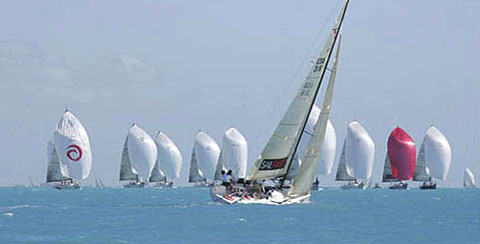 A Mumm 30 beating upwind faces a wall of new Farr 40 masthead kites in Monday's racing. Peter Craig and his team at Premiere Racing who are running Acura Key West 2007 through January 19 must have some chips to cash in with the weather gods this week in the Conch Republic. Despite light to moderate breezes, the air is warm, the skies are clear and forecasters are predicting a slight increase in wind pressure as the week continues. Yes, it's official: we're jealous. With teams reaching the halfway point today, if they're not fully in the swing of it now, it's going to be a tough road for the remainder of the regatta. America's Cup defender Alinghi CEO Ernesto Bertarelli and four of his crew, on a 'working vacation' from AC training, have posted all top-five finishes and hold a firm lead in the 17-boat Farr 40 fleet. Italian Giulietti Armando leads the 10-boat Mumm 30 fleet. In the 40-boat Melges 24 division, the largest at this year's regatta, Italian Giovanni Maspero has a good hold on first with a 14-point lead. Of the Bay Area contingent, Steve Pugh is in 16th, Peter Lane is in 29th and wife Kristen Lane is not far behind in 31st. 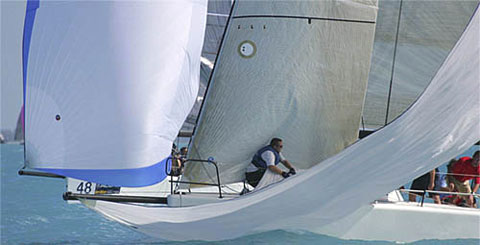 Melges 32s set their spinnakers at the top mark on Monday. The 20-boat Melges 32 fleet is led by Claudio Recchi on Let's Roll with a 1, 1, 3, 1 and 10 points ahead of second-place Glenn Darden's Hoss and third-place Jeff Ecklund's Star, which are tied with 16 points. The Bay Area's Caleb Everett on Stewball is in 17th place. Edgar Cato's Farr 60 Hissar leads the big boat IRC-1 fleet by 2 points and Doug De Vos's TP52 Windquest leads IRC-2 by a hair, as does Makoto Uematsu's brand new Club Swan 42 Esmeralda in IRC-3. Turning in the most consistent performance so far is Rhumb Punch. The Maryland-based J/29 has four bullets in the 9-boat PHRF-5 fleet. 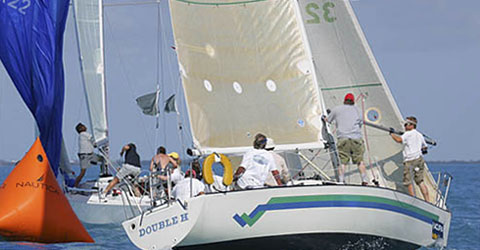 Key West isn't just for the hot one design and IRC classes. Many sailors make the pilgrimage to KWRW for stiff competition in the PHRF classes. Photos Tim Wilkes/Acura Key West/timwilkes.com Complete results are at www.premiere-racing.com. ESPN has a daily
video update on its Web site. Go to http://espn.go.com and search Multimedia
for Key West. - latitude / ss |
USA 98 Travels to Auckland for Maiden VoyageJanuary 17 - Auckland, New Zealand With less than 90 days until the start of the challenger series for the 32nd America's Cup, BMW Oracle Racing's new race boat, USA 98, took its maiden voyage Tuesday at the team's winter training base in Auckland. 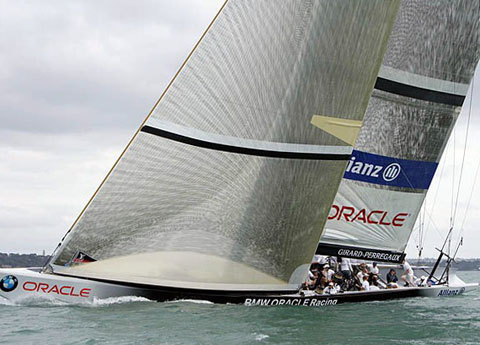 "The report card comes when we sail with the boat fully-loaded in race mode, but for sailing right out of the box, 98 feels pretty special," says BOR CEO Chris Dickson. USA 98, which was built in Anacortes, WA, and had a lengthy trek via ship and truck to Auckland earlier this month, will undergo sea trials on the Hauraki Gulf this week before the team commences two-boat testing until February. From there, it's back to Valencia to wrap up race preparations before the the big show begins in April. - latitude / ss 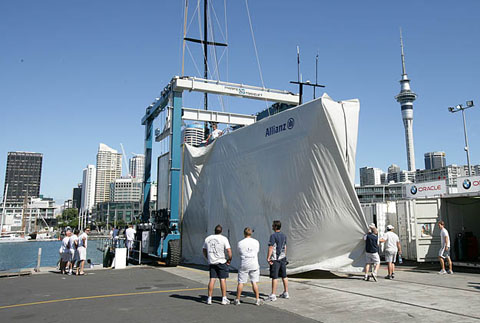 A fully-dressed USA 98 at the team's Auckland base. With all AC campaigns operating under super secrecy mode until 'Unveiling Day' on April 1 in Valencia, boats continue to wear their skirts when not out sailing. Photos Gilles Martin-Raget/BMW ORACLE Racing |
Wanted: Antique EPIRBsJanuary 17 - Sausalito/Mill Valley We're looking for a few good EPIRBs - and by good we mean bad. If you've been affected by the prohibition of the old, unreliable 121.5 MHz EPIRBs, we'd love to get a shot of yours before you chuck it. On that note, we received several emails wondering what people should do with those old EPIRBs. Peter Thorner with the Sausalito/Golden Gate USCG Auxiliary informed us that, first and foremost, the battery should be removed from the unit to prevent a false alert. After that, you can ship it back to the manufacturer, who will destroy it, or you should "damage it to render it inoperable." Remember, the prohibition does not apply to the small 121.5 MOB devices. - latitude / ld |
A Different Kind of 'Around the Horn' SailingJanuary 17 - St. Barth, French West Indies Last night we sat down and heard some more tales from our friend Marius Stackelborough, the 83-year-old owner of Le Select, the most famous sailor's bar in not only St. Barth, but the entire Caribbean. 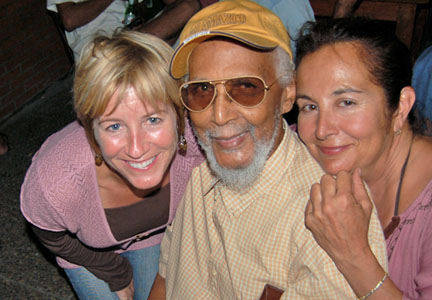 The three in the photo are Kitty Gardener, Marius and Doña de Mallorca. In deference to his age, Marius now drinks apple juice instead of 'ti punch. Photo Latitude/Richard
If you can't imagine what being a seaman was like in the Caribbean back then, one of Marius' stories will give you an idea. Back in those days, they used to transport cattle on the hoof aboard sloops and schooners from St. Barth to places like St. Kitts, Guadeloupe, and the U.S. Virgin Islands. A couple of guys would get in a rowboat, wrestle the angry cow down into the water and alongside the sloop or schooner. And then - PETA members should stop reading now - they would put a line around the horns of the cow and hoist it on deck with a block and tackle from the top of the mast. "It was a horrible way to treat the animals," says Marius, "but that's the way it was done back then. Eventually, that kind of treatment was outlawed by the British, and the practice was stopped everywhere. After that, we used a harness to lift cattle aboard ships." Life didn't get much better for the cattle
once they were sailing on the often rough waters of the Caribbean
Sea. Marius says it was not uncommon for cows to be lost overboard.
There were no cow overboard procedures, so unless the waters
were unusually calm, cows that went overboard bought the farm,
so to speak. But if these were hard and dangerous passages for the cattle, they were just as hard and dangerous for the crew. "In rough weather, we had to work like crazy to keep the deck scuppers clear and draining. But it was difficult, because they'd get clogged with hay and cow shit, and the combination of that with cow piss made the decks very slippery. It wasn't nice work having to keep those scuppers open, but if you didn't, the boats would become unbalanced and roll over. In addition to cows, we used to carry horses, mules and other animals as deck cargo. It was a hard life. It's a wonder I lived to 20, let alone 83." And it's no wonder that Marius started Le Select, which Jimmy Buffett made famous in the song Cheeseburger in Paradise. But back in '49, about 25 years before the first tourists came to the island, Le Select was hardly the busy watering hole it is today. Things were so slow that Marius and his friend Maxi used to run fishing lines out of the bar windows into Gustavia Harbor. And with patrons few and far between, Marius had other jobs. He was the only photographer on the island for 35 years, and he also used to work for the French Meteo, and remembers the island being hit by a hurricane in February. Le Select was also the kind of place where you could get just about anything you wanted. "It served as the first and only record store on the island for many years, we sold children's schoolbooks, and for older folks, we used to sell books by the likes of Henry Miller. If you were too shy to buy condoms from the pharmacy, you could buy them at the bar. If you needed a pill for your wife to have a baby, you could get that at Le Select, too. About the only thing we never sold was drugs. I'd never allow that." The irony, of course, is that Le Select was probably patronized by more drug smugglers than any other bar in the Caribbean, at least back in the happy-go-lucky amateur pot smuggling days of the '70s. - latitude / rs |